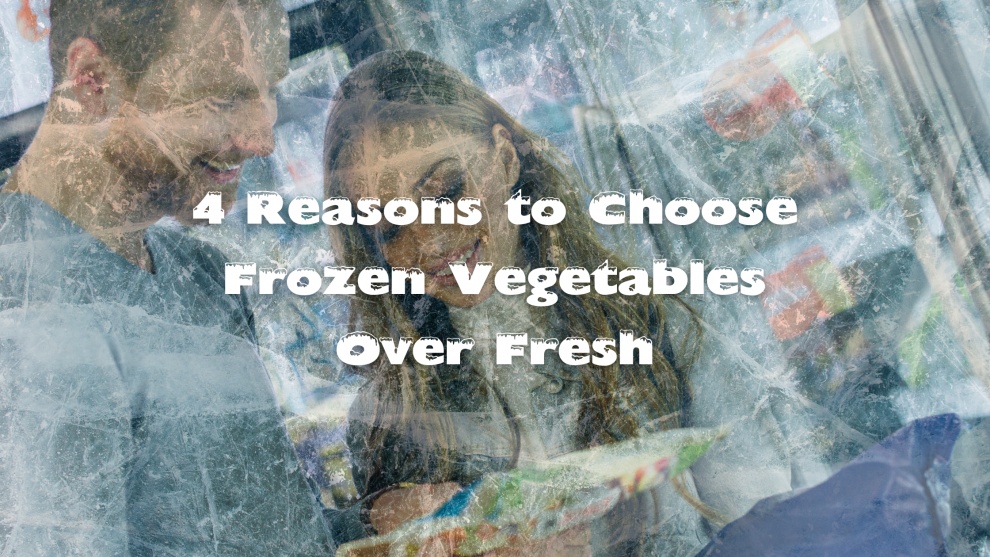
4 Reasons to Choose Frozen Vegetables Over Fresh
For decades, the U.S. frozen food industry has had to battle the false reputation that its products are inferior to fresh offerings in terms of taste, quality, and nourishment. This is despite the fact that over the past 50 years, the amount of time Americans spend preparing meals has drastically declined.
The good news is that the frozen food sector’s image has slowly started to turn around in the eyes of consumers, most importantly amongst those more health-conscious shoppers. Perhaps that’s why, according to a report by Grand View Research, the U.S. frozen food market is expected to grow to $72.98 billion by 2024.
If you’re still torn between the two, here are four compelling reasons to buy frozen vegetables instead of fresh ones on your next trip to the supermarket.
1. FROZEN VEGETABLES PROVIDE ADDITIONAL NUTRITION
This may seem counterintuitive, but frozen vegetables can actually be better for you than fresh produce. In fact, according to a University of Georgia study, several frozen fruits and vegetables contain higher amounts of Vitamin A, Vitamin C, and folates when compared to their fresh counterparts.
So how is that possible? Produce is at its peak level of nutrition when it’s fully ripe and has the amount of time necessary to completely develop its vitamins and minerals. Despite that, fresh vegetables are picked prior to reaching full maturity to avoid becoming overripe in transit or before they can be sold at the store.
On the other hand, vegetables selected for freezing are picked at peak ripeness and processed immediately to avoid any potential nutrient loss. They are then blast frozen to lock them in their most nutrient-rich state where they remain until they are purchased and consumed.
2. FROZEN VEGETABLES ARE MORE COST-EFFECTIVE
If you’ve ever paid attention at the grocery store, you’d know that frozen produce can be significantly cheaper than fresh, making it accessible to more people. In fact, we compared prices for similarly sized offerings of three popular vegetables at Walmart—one of the largest grocery chains in the country—and found the following results:
Spinach:
- 12 oz Frozen Chopped Spinach – $1.00 (8.3 ¢/oz)
- 10 oz Market Fresh Spinach – $2.38 (23.8¢/oz)
Corn:
- 12 oz Frozen Whole Kernel Corn – $0.78 (6.5 ¢/oz)
- 4-Pack (32 oz) of Fresh Corn on the Cob – $4.17 (13 ¢/oz)
Broccoli:
- 12 oz Frozen Broccoli Florets – $1.00 (8.3 ¢/oz)
- 12 oz Fresh Broccoli Florets – $2.68 (22.3 ¢/oz)
So why are frozen vegetables more cost-effective? There are several factors, but the biggest one is the difference in supply chain costs. Fresh produce must be harvested, packed, shipped, displayed, sold, and consumed all in a very short period of time. If you’ve ever had something shipped before, you’d know that the sooner you want it, the more you’re going to have to pay.
Frozen produce, on the other hand, has the advantage of time on its side. Since it’s cheaper and easier to ship, store, and sell, those savings all get passed on to you, the consumer.
3. FROZEN VEGETABLES PRODUCE LESS FOOD WASTE
Another reason frozen produce is more cost-effective is that it produces less food waste. It may be hard to believe, but food waste is currently more expensive than the total cost of electricity to keep a frozen vegetable frozen. To make up for all the inevitable food waste that occurs along the supply chain journey, retailers are forced to apply a relatively high margin on fresh produce in order to turn a profit.
According to estimates from the USDA Economic Research Service, between 30–40 percent of the U.S. food supply gets wasted at the retail and consumer levels each year. That means roughly 133 billion pounds of food is sent to local landfills instead of going to families in need. Buying frozen produce is just one way to help reduce this unnecessary waste.
4. FROZEN VEGETABLES ARE MORE CONVENIENT FOR CONSUMERS
We’d be lying to ourselves if we said we didn’t make decisions based on convenience alone—and buying vegetables is certainly no exception. While today’s global market means we have access to an abundance of foods all year round, this isn’t always the case. Some fresh vegetables aren’t readily available in the winter months—or are more expensive if they are—but this is rarely the case with frozen offerings.
In addition, frozen vegetables are more convenient at home too. They last longer, so you’re more likely to have them on hand when you need them. They’re also typically prewashed and precut, making them much easier to prepare and cook, which is a true win-win in any kitchen.
FINAL THOUGHTS ON FROZEN VEGETABLES VS. FRESH
Now that you know frozen vegetables are more nutritional, cost-effective, and convenient than fresh produce—not to mention far less wasteful—you may want to mosey on over to the frozen foods aisle next time you’re in the supermarket and stock up on these incredible offerings.
.jpg)
Does your company produce, distribute, or sell frozen vegetables? Or perhaps you have a different product that also requires cold storage. If that’s the case, contact Florida Freezer today to safely store and transport your frozen produce.
Florida Freezer is a family-owned and operated company with almost 50 years in the cold chain transportation and warehousing industries. Let our team of professionals take care of your cold storage and supply chain needs.
